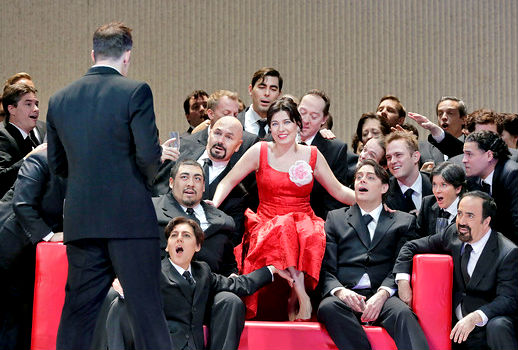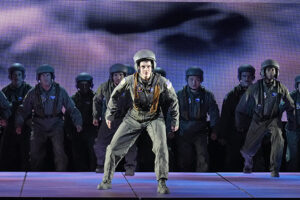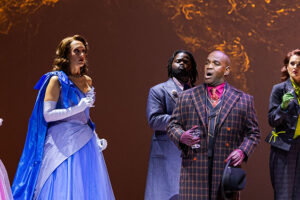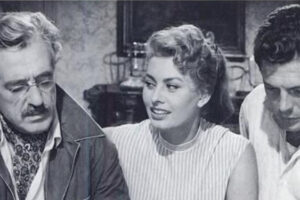

It’s four years later now and it turns out that sopranos of various sizes and shapes have adapted into the red dress, and the production has proved to be one of the Met’s most solid, convincing (and ticket-selling) standard repertory staples. This season it’s scheduled for no fewer than 12 performances with two different casts. Verdi must have gotten tired of tossing and turning by now and has gone back to resting in peace.
It turns out, however, that the trouble with casting this production is not finding Violettas, but finding suitable Alfredos. I’ve seen every cast and no Alfredo has ever looked really comfortable with the Decker staging. Maybe it’s the fact that the Alfredos are asked to prance around in white boxers, and shove currency up Violetta’s skirt. Matthew Polenzani was his usual stylish, elegant self, but was never convincing.
Saimur Pirgu was cute, and that’s about it. At the premiere of this season’s revival the performance was delayed for almost half an hour because of a last-minute cancellation by Stephen Costello, and Francesco Demuro sang instead. This prompted an unusually harsh rebuke from the normally tactful Anthony Tommasini.
The pre-performance buzz at tonight’s performance was basically, “Will Costello sing?” Well, lights dimmed, no announcement was made, Marco Armiliato picked up his baton and the “death motif” started so the question was answered.
Now, before I talk about Costello, a little history is needed. I first heard of him as the hot new tenor a few years back, and thought he sounded good if not spectacular based on brief YouTube clips. Then I actually heard him in Anna Bolena. He looked terrified and spent most of the evening hiding behind the various pillars in David McVicar’s production. His voice was a narrow, squeezed tube of sound that often turned into a bleat. This was the hot, talked-about tenor? I saw an equally unimpressive performance at the OONY Roberto Devereux where he again totally pooped out of his cabaletta and I was kind of done with him.
Well, tonight, as Alfredo, I heard for the first time what the original fuss might have been about. When not asked to sing around the passaggio or above the staff, his voice has a pleasant, lyric quality. His voice is not large, but the acoustically friendly set helped all the voices project well.
And for whatever reason, he fit into the Decker production better than the previous Alfredo’s. His introverted, reserved stage presence seemed more natural and less affected, and you could believe that this Alfredo was a naive country bumpkin who didn’t fit in with the demimonde society. “Un dì, felice” contained some lovely singing.
Alas, the double aria in Act Two exposed his weaknesses again. When he pushes his voice it acquires that unpleasant bleat, and his pitch sags. He took one verse of “O mio rimorso” and his habit of conking out of cabalettas continued—he dropped out of the final bars completely. I thought he was taking the discretionary tenor drop-out so he could interpolate a high C. But alas, no high C, just a dash offstage. I do think however that Alfredo is more simpatico to his voice than those high-lying primo ottocento tenor roles.
Anyway I bought the rush ticket to see Marina Rebeka. I heard Angela Meade sing Mathilde and I hated it. I went home and found a video of Rebeka singing the same music. Ah, so this is how it’s supposed to sound! Rebeka didn’t disappoint either as Violetta.
Her voice is big, well-produced, with a bright metallic edge and she doesn’t sound inherently tragic. But she sings the role with a fine accuracy and style. She observed the slight hesitancy in the opening notes of “Ah, fors’è lui” and “Sempre libera” was actually pretty dazzling, wiry interpolated E-flat aside.
Rebeka’s voice sounds healthy (a good thing), and she also looks very healthy (not necessarily a good thing when playing Violetta). One of the charms about the real-life Marie Duplessis was that despite her staggeringly expensive tastes (she owned a stable of thoroughbred horses), fickle nature (she bragged that lying made her teeth whiter), and dirt-poor background (her father pimped her out at the age of 11 in the countryside before she moved to Paris), she looked so gosh-darned delicate and vulnerable. She had pale skin and wore her hair in dark ringlets and looked so lady-like.
Rebeka has an energy and spirit that resembles the hearty lasses in Littlefinger’s whorehouse rather than delicate flower Marie. But to her credit, she didn’t aim for that weak frailty—there was no overdone coughing or making the voice paper-thin for Act Three. It was a straightforward, well-sung Violetta and she had a lot of horsepower for the big moments.
In the Act Two concertato you heard her firm, bell-like sound ride over the chorus and orchestra. She was able to swell her voice for “Amami Alfredo” and the final “Oh gioia!” If she didn’t quite convince you that she was wasting away from a terminal illness, she wasn’t pretentious either, and it was never difficult or unpleasant to listen to her. She got a well-deserved standing ovation at the end of the opera.
I might also add that Anna Netrebko, the original, canonized Violetta of the Decker production, wasn’t really convincing as the delicate dying flower either. I expect Sonya Yoncheva will be a sensation when she takes over the run in mid-January but go see Rebeka as well. She’s really excellent.
Quinn Kelsey (Germont) also got a lot of buzz after opening night. I think pickings are so slim nowadays for “Verdi baritones” that it’s a relief just to hear a baritone who isn’t pushing and barking his way through the music. Kelsey does have a rock-solid voice with a very free top, but I wasn’t really crazy about Kelsey’s interpretation of Germont. It was a very cold, brutish take on the role.
I know part of that is Decker’s production but there’s no ambiguity or hint of tenderness about this Germont. I think Placido Domingo, awkward aging baritenor voice aside, actually captured the mix of paternalistic condescension, genuine remorse, and stubborn self-righteousness the best out of the Germont’s I’ve seen in this production.
If there’s a conductor more adored by sopranos than Marco Armiliato I haven’t seen him. Every soprano I’ve ever seen in every performance has made a beeline for Armiliato during the curtain calls to give him a big smooch and eager hug. If he can please the divas I’m sure he’s doing something right but from an audience perspective he’s the most uninspired routinier who plodded through the music without energy or individuality.
I was also dismayed at all the cuts that were taken. The second verse of “Ah, fors’è lui” was gone. “O mio rimorso” was also pared down to one verse, and of course they took the “big cut” in “Parigi o cara.” It’s always a mystery why an opera that uncut runs less than two and a half hours gets the scissors.
This is the first opera I’ve seen under the new, new rush ticket system. I figured out the rules of how to secure a ticket: you must log into the Met’s website before noon. Have all your payment information saved. For some reason I’ve found that my phone is faster than my computer. At noon, on the dot, press the button for rush tickets. Select “best available” and you can get your tickets. The trick is to do all of this within a time-span of less than two minutes.
And come to think of it, this was the perfect “rush ticket” performance. It’s not something I would have gone to the trouble to secure a full-price ticket, but it wasn’t so awful that I felt a $25 orchestra seat was still three hours of my life I’d never get back. I think I’m going to group all performances into three categories from now on: the great standalone performances, the truly awful performances, and the “rush ticket worthy” performances.
Photo by Ken Howard/Metropolitan Opera.
























Comments